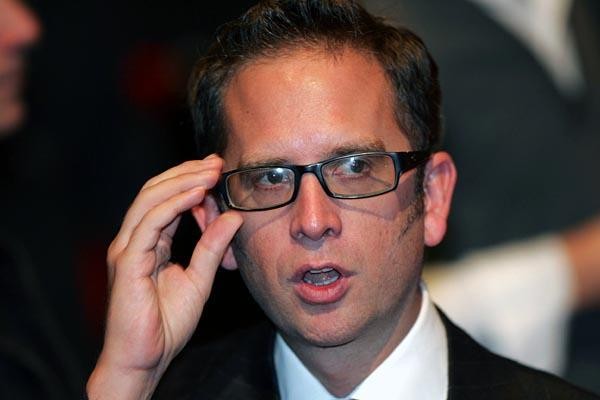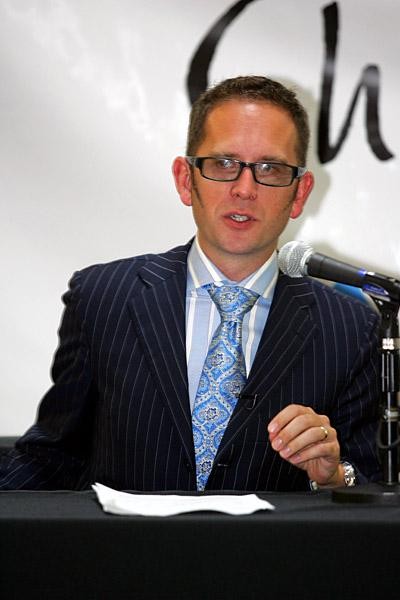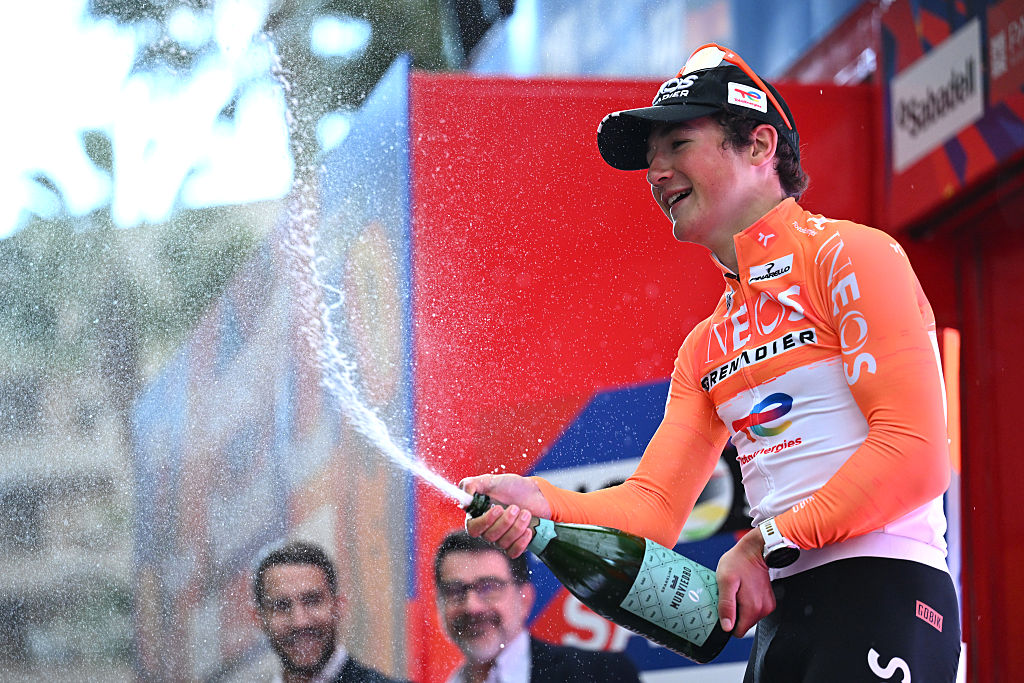Jonathan Vaughters: From a $50,000 team to vying for world #1
Part II - the growth of a super team
The latest race content, interviews, features, reviews and expert buying guides, direct to your inbox!
You are now subscribed
Your newsletter sign-up was successful


In Part I of an in-depth feature interview, Jonathan Vaughters talked about his own career as a professional rider and how he quit the sport after being mocked by another rider after he refused to secretly take cortisone to cure his bee sting in the 2001 Tour de France.
Here in part II he talks about what has happened since then: the creation of his Garmin-Cervélo super team from its start as a fledgling development squad in the USA.
Eight years on
Eight years on from Vaughters' retirement in 2002, I approach the apparent incongruity between the version of the events Vaughters described to me and the one he related to Paul Kimmage.
He replies by opening his heart. “In 2002 I was just... inconsolably lonely and homesick. He [Legeay] knew – it was certainly not the fault of Roger Legeay. Sometimes, it takes a bit of time to get perspective on these things and when I talked to you, it was probably a couple of weeks after that. I was just tired; I was just tired of being a European professional rider, pure and simple. At the end of the day, I was a little burnt on the lifestyle. Not the lifestyle of living in Europe, just the lifestyle of being a professional cyclist. That last year was... I was depressed. I was over it.”
“You know what? They’re both true. I can attribute that partially to the wasp sting [incident] – that did play a big part – but it was also... I just wasn’t there... My heart wasn’t there anymore. So it’s sort of a combination of things that conspired to end a career.”
These may seem like minor details in the life of Jonathan Vaughters. But in actual fact, they go some way in explaining the origin and development of his success as a rider-cum-coach-cum-team manager-cum-general manager, motivator and public face of what many view as cycling’s preeminent team – a team which Vaughters has staked his reputation on to race clean. Which, as the cycling world attempts to get up from its knees and challenges riders to leave the omerta behind, actually means something.
The latest race content, interviews, features, reviews and expert buying guides, direct to your inbox!
$50K can go a long way...
Upon his retirement in 2003, Vaughters appeared to enjoy ordinary life. He wrote wine columns and antique furniture reviews and dabbled on the stock market. That was until later that year, when with $50,000 of his own money, he created a junior development squad called Team 5280.
“I started with no aspirations of being a ProTour team or anything else like that. I wanted to give back a little bit to the sport,” he says. “I had a different job, doing a completely different thing than anything to do with cycling. At that point in time, no-one was really developing U-23 riders; there were basically no U-23 teams at that point in time in America. So, I just figured I wanted to fill the gap, do something that was fun for me. It was a hobby, and it was me giving back to the cycling community.”
Serendipitously, Vaughters met Steve Goldstein that same year, a man he considers to be his business mentor. At the time, Goldstein, a communications expert who served in the first Bush Administration in the Office of Public Affairs in the US Department of the Interior, was head of Public Affairs at the Wall Street Journal. He sent a note to Vaughters, saying “I’m very interested in cycling – and especially interested in losing about 30 pounds – and could I hire you to help me do that?”
“And he wrote me back and said: ‘I’ll do that for you if you teach me how to run a business’.”
“And through that I got to know him well... I got to know him very well, actually,” says Goldstein, who left the WSJ not long afterwards to join an investment banking firm, TIAA-CREF, one of the nation’s 100 largest companies at the time. An older company that wanted to modernise its brand, TIAA-CREF decided, after much polling, that one of the best ways to do that was to sponsor a cycling team. “We hired Vaughters to be the coach of our team,” Goldstein says.
Of Vaughters’ business nous, he says diplomatically: “I think he acknowledged that he didn’t know much about how business operated. But he was a willing student.”
“After the first year,” recalls Goldstein of TIAA-CREF’s maiden season in 2004, “he said to me: ‘Some of these riders could go to the Tour de France. I would love to run a team that would ultimately get to the Tour.’ And he mapped out a plan for doing so. And he followed that plan.”
Thinking big – and now livin’ large
In 2005, after a meeting with New York philanthropist and cycling nut Doug Ellis, the foundations were laid for something much more grandiose. But at first, Vaughters wasn’t convinced: “I’d prefer to stick with the kids,” he told Ellis, warning him of the inherent nature of professional cycling and its historically flawed doping culture. “Doug, at the end of the day it may not work,” he insisted. “And I don’t want to blast through 15 or 20 million dollars, so I’m warning you, right now.”
As Kimmage wrote of the meeting’s outcome, Ellis decided to press ahead: “This may not be a terribly fun journey but it is going to be a challenge,” he told Vaughters.
“Nowadays, it’s s a 120-person operation, functioning in three different time zones at any given moment,” Vaughters says of his Garmin-Cervélo team with pride.
Is Goldstein surprised at what he’s achieved? “No. I’m not surprised because he’s a very singularly focused person – and that’s good and bad,” he says.
Goldstein, who now works at an even larger investment banking firm in New York, remembers an article he read in the New York Times a few months back, about a 20-year-old venture capitalist. The headline was: ‘Just manic enough. Seeking the perfect entrepreneur.’ “It was about people that are some ways hyper-manic; that is, very focused on winning and they want to move quickly. Jonathan is that person,” he says. “He’s just manic enough!” But, Goldstein warns me, “He has to sometimes pull himself back a little. He can also take things too personally; he wants to be liked. Sometimes in business you can’t be liked. But he’s a very principled person. And he is very caring about the people on his team.”
The lingering questions
As much as it easy to admire what Vaughters has done with his team and the way he’s done it, a question refuses to go away: Does he not feel his choice not to unequivocally say whether he did or did not dope is contradictory – even hypocritical – to the transparent ideals he imbues and boasts? He believes not.
“At this point in time it’s so far in the past it’s... At the end of the day, this isn’t about me; this team is about the riders and the results they produce on the road and it’s their stories and the sport,” he says. "So it’s not about me. That’s the basic reason why – I don’t feel like it’s something worthwhile to comment on.”
But what if the investigation championed by US Federal investigator Jeff Novitzky into the practices of Lance Armstrong and his teammates at the US Postal Service, leads to him t testifying? And what if that information becomes public?
“I’m totally comfortable with that. I don’t really see an issue with that. I think we’ve issued a statement that was more than clear, saying that anyone that is part of this organisation of Slipstream is compelled by the organisation, by the employer – meaning me – to be completely transparent and honest about what happened in the past. And that includes me, as I am an employee of Slipstream Sports as well.”
But if he’s not afraid of the past, is it not better that the truth comes from him rather than belatedly coming from Novitzky and his coterie, and splashed over the pages of various media outlets? Won’t that be more of a “distraction”, as he puts it, and detrimental to his team’s image than a straight-out mea culpa?
“That’s a fair question,” he replies.
“The need to be completely forthcoming and honest and transparent is clear; if you are to pursue clean sport and you are to claim that your team is founded on the principle of pursuing clean sport, then you need to be honest with those people, absolutely, with no question and no hesitation. Whether they [the Federal investigators] bring that to light publicly or not is really their choice, and that is their decision and in their realm. And I’m comfortable with whatever they choose – I really am. Whatever they chose to do, I’m comfortable with that decision.”
“Again, I understand there is absolute honesty and transparency when it comes to these investigations. Otherwise, I can’t claim to be who I am, or that my claims are false, and I can’t claim that the team is founded in the way it is – we have to be honest in those situations, otherwise Slipstream Sports isn’t what we purport ourselves to be.”
“Saddled with an image we’ve brought upon ourselves”
So is Vaughters saying he doesn’t want his story to overwhelm that of his team?
“Precisely. I just don’t believe in sensationalism. I think doping issues, they need to be solved in a pragmatic and efficient way – but the sensationalism that goes along with them, is just something that I don’t appreciate. At the end of the day, what everyone is after in sport, is that we have clean competition and that we have a clean winner and that the races are real and that the veracity of those race results is assured.”
“Now, what seems to me to be happening over and over again is that a high-profile person will test positive and that completely hijacks the fact that you’ve got a complete turnaround in the majority of the peloton’s direction as far as doping goes. And quite frankly, it’s offensive to those who work in anti-doping that their efforts are hijacked whenever a high-profile rider tests positive or whatever else.”
“Fundamentally, I just don’t believe in the sensationalism that goes along with these positive tests or admissions. What I feel needs to happen, very simply, is that the rules need to be enforced; the science behind the enforcement of those rules needs to continue to get better; and that people need to continue to push on those efforts in making sure that they’re properly funded, and making sure that we really support the efforts of those people that are in anti-doping... That’s the method to get rid of this... to continue to push for science, to continue to push for testing, and continue to change the culture from inside teams in cycling.”
After three lengthy phone calls and a few text messages that left me somewhat exasperated, Vaughters perhaps sums up the situation best when he says this: "We've saddled with an image that we've brought upon ourselves by trying to correct the problem.
"I think anyone in my family, in my personal life, and any member of our team, our organisation, any employee of mine, is very aware of what my history is in the sport of cycling, and the good points and the bad points. To make that a public issue, I think the logic in that is fundamentally flawed."
No more than half an hour after our last phone call on the subject, he sends me a text message.
"Catharsis! That's the word I was looking for! It would be selfish of me to pursue catharsis at the expense of the accomplishments of the athletes who race now."
I fire one back: "It's a good word! I understand where you're coming from, and [am] beginning to agree."
Extracting absolute potential
In the August 2002 interview, Vaughters told me: “Being overly-cerebral is definitely a hindrance as far as bike racing goes, but it’s just sort of a fact of life that if you’re just a bit more of an instinctual person it tends to work out a little better in racing. But as far as messing up my training, I don’t think so. If anything, I think my knowledge has enabled me to drag myself closer to my absolute potential than 98 percent of the guys that will ever make it [as a pro rider].”
Eight years on, looking what he and his team have achieved with the likes Christian Vande Velde, Bradley Wiggins, Tyler Farrar, David Zabriskie, Chris Sutton, Svein Tuft, Daniel Martin, Cameron Meyer, David Millar and Ryder Hesjedal, it’s hard to argue that he hasn’t managed to extract close to the absolute potential of many of the riders he’s hired, or at the very least, push them in the right direction.
Vaughters says that Chris Boardman, his only real friend at Crédit Agricole, is another example of one who got the most out of his career because of the way he was, even if the Briton opted to end his early. “So if anything, he and I are examples of people who surpassed what their bodies were really capable of in their time as cyclists,” he points out.
Now, with the help of 119 others, Vaughters is doing the same for the riders he employs. The weak cub turned brutal tiger is ready to take his team to number one in the world.
